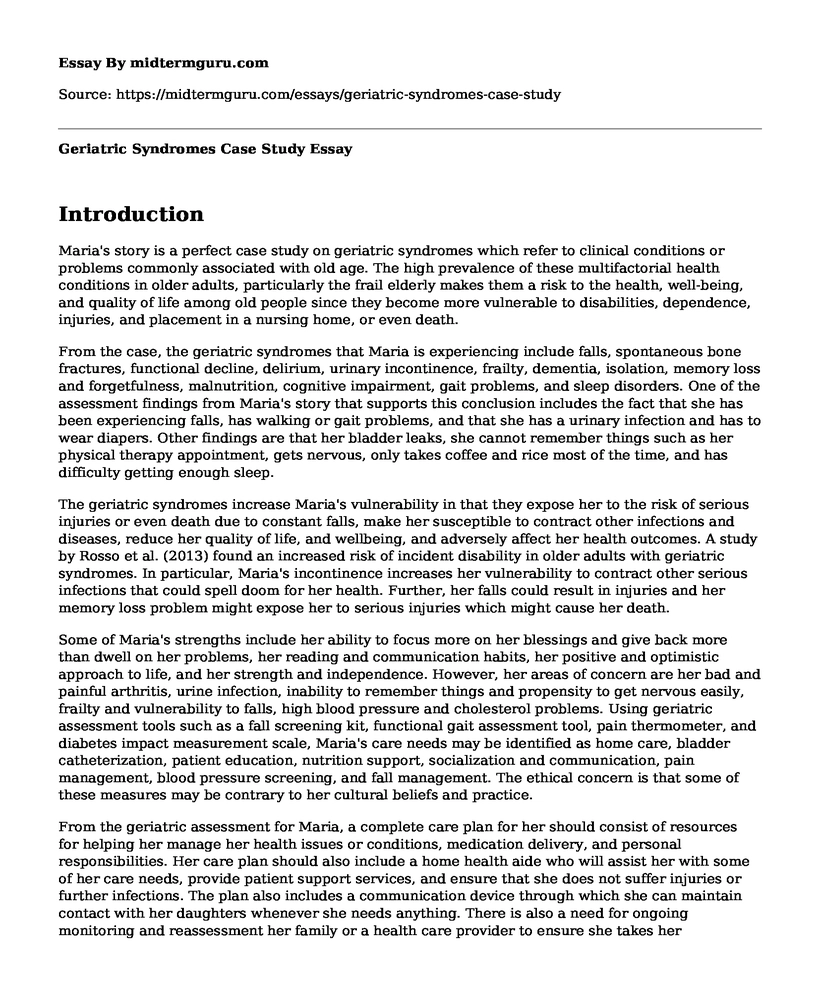Introduction
Maria's story is a perfect case study on geriatric syndromes which refer to clinical conditions or problems commonly associated with old age. The high prevalence of these multifactorial health conditions in older adults, particularly the frail elderly makes them a risk to the health, well-being, and quality of life among old people since they become more vulnerable to disabilities, dependence, injuries, and placement in a nursing home, or even death.
From the case, the geriatric syndromes that Maria is experiencing include falls, spontaneous bone fractures, functional decline, delirium, urinary incontinence, frailty, dementia, isolation, memory loss and forgetfulness, malnutrition, cognitive impairment, gait problems, and sleep disorders. One of the assessment findings from Maria's story that supports this conclusion includes the fact that she has been experiencing falls, has walking or gait problems, and that she has a urinary infection and has to wear diapers. Other findings are that her bladder leaks, she cannot remember things such as her physical therapy appointment, gets nervous, only takes coffee and rice most of the time, and has difficulty getting enough sleep.
The geriatric syndromes increase Maria's vulnerability in that they expose her to the risk of serious injuries or even death due to constant falls, make her susceptible to contract other infections and diseases, reduce her quality of life, and wellbeing, and adversely affect her health outcomes. A study by Rosso et al. (2013) found an increased risk of incident disability in older adults with geriatric syndromes. In particular, Maria's incontinence increases her vulnerability to contract other serious infections that could spell doom for her health. Further, her falls could result in injuries and her memory loss problem might expose her to serious injuries which might cause her death.
Some of Maria's strengths include her ability to focus more on her blessings and give back more than dwell on her problems, her reading and communication habits, her positive and optimistic approach to life, and her strength and independence. However, her areas of concern are her bad and painful arthritis, urine infection, inability to remember things and propensity to get nervous easily, frailty and vulnerability to falls, high blood pressure and cholesterol problems. Using geriatric assessment tools such as a fall screening kit, functional gait assessment tool, pain thermometer, and diabetes impact measurement scale, Maria's care needs may be identified as home care, bladder catheterization, patient education, nutrition support, socialization and communication, pain management, blood pressure screening, and fall management. The ethical concern is that some of these measures may be contrary to her cultural beliefs and practice.
From the geriatric assessment for Maria, a complete care plan for her should consist of resources for helping her manage her health issues or conditions, medication delivery, and personal responsibilities. Her care plan should also include a home health aide who will assist her with some of her care needs, provide patient support services, and ensure that she does not suffer injuries or further infections. The plan also includes a communication device through which she can maintain contact with her daughters whenever she needs anything. There is also a need for ongoing monitoring and reassessment her family or a health care provider to ensure she takes her medication and checks on her health. According to Molony, Kolanowski, Haitsma, and Rooney (2018), a care plan which is patient-centered and actively involves or engages patients and their families is effective in improving care outcomes and recovery.
Conclusion
In conclusion, based on the assessment, I do not think that Maria is able to remain living at home independently because is at risk of developing more infections, needs a constant watch, care, and support, suffers from memory loss, and is vulnerable to injuries caused by falls. The risks of Maria living at home include the risk of falling, acquiring more infections, and being a victim of an accident at home while the benefits of her living at home are that she will be able to take care of herself, take care of her home, and communicate freely with her family whenever she needs support. The resources that Maria will require include self-care management resources, social support, and walking aids. The alternatives include being placed in a nursing home or facility and going to live with either of her daughters where she will receive the necessary care and assistance.
References
Molony, S.L., Kolanowski, A., Haitsma, K.V., & Rooney, K.E. (2018). Person-centered assessment and care planning. The Gerontologist, 58(1), 32-47. Doi: https://doi.org/10.1093/geront/gnx173
Rosso, A.L., Eaton, C.B., Wallace, R., Gold, R., Stefanick, M.L., Ockene, J.K., Curb, J.D., & Michael, Y.L. (2013). Geriatric syndromes and incident disability in older women:Results from the women's health initiative observational study. Journal of American Geriatric Society, 61(3), 371-379. doi: 10.1111/jgs.12147
Cite this page
Geriatric Syndromes Case Study. (2022, Aug 31). Retrieved from https://midtermguru.com/essays/geriatric-syndromes-case-study
If you are the original author of this essay and no longer wish to have it published on the midtermguru.com website, please click below to request its removal:
- Essay on Problem in the Nursing and Health Profession
- Napping on the Night Shift: A Two-Hospital Implementation Project Paper Example
- Paper Example on Psychological Benefits of Touch Bond after Birth
- The Effects and Benefits of Drugs on Society - Paper Example
- Social Work Administration - Essay Sample
- Employee Insurance in Germany: Deduction, Funds, and Coverage - Essay Sample
- Similarities in The Bear Came Over The Mountain and Away From Her - Essay Sample







